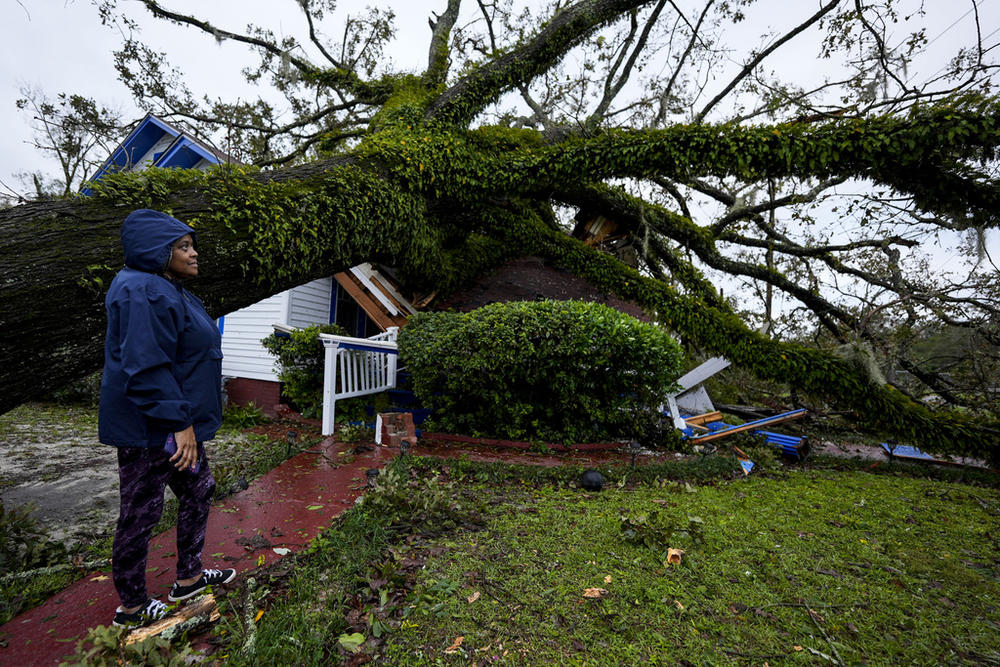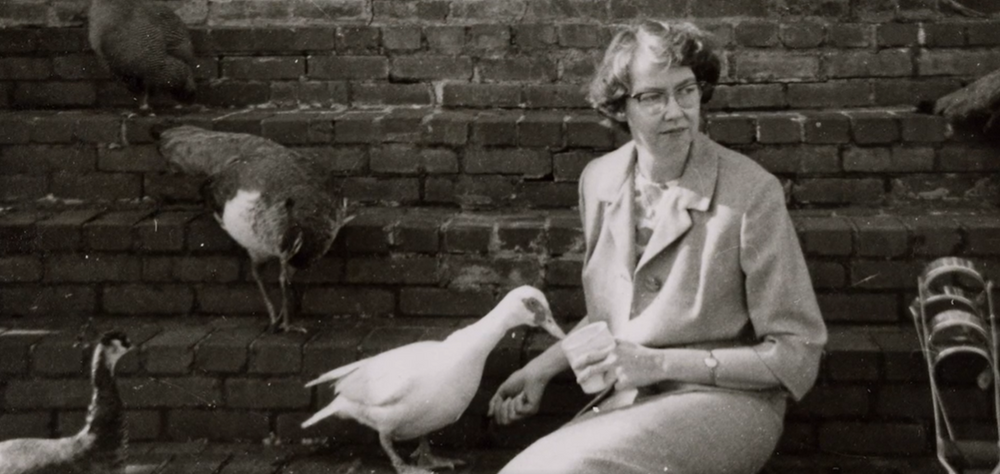
Section Branding
Header Content
Georgia Today: Americorps workers laid off; New police training; Flannery O'Connor paintings exhibit
Primary Content
On the Thursday May 1 edition of Georgia Today: Americorps volunteers across Georgia face layoffs from the Trump administration; the Georgia Alzheimers Association partners with state law enforcement for a new training initiative; and a Milledgeville farm hosts an exhibit of paintings by author Flannery O'Connor.

Peter Biello: Welcome to the Georgia Today podcast. Here, we bring you the latest reports from the GPB newsroom. On today's episode, AmeriCorps volunteers across Georgia face layoffs from the Trump administration, the Georgia Alzheimer's Association partners with state law enforcement for a new training initiative, and a Milledgeville farm hosts an exhibit of paintings by author Flannery O'Connor.
Katie Simon: She's painting things she saw every day, and it helps kind of fill out the context of her last 14 years or so of her life.
Peter Biello: Today is Thursday, May 1. I'm Peter Bielo, and this is Georgia Today.
Story 1:
Peter Biello: Gov. Brian Kemp signed a series of health care bills today. GPB's Sofi Gratas has more.
Sofi Gratas: At Savannah's Convention Center, Kemp signed legislation committed to, quote, "health and well-being." Included was a bill that enshrines access to in vitro fertilization and one that requires insurers cover IVF treatment when a medical diagnosis threatens fertility. After the Alabama Supreme Court ruled that frozen embryos are children, many states moved to protect IVF. Georgia's bill to address the, quote "uncertainty" passed almost unanimously.
Brian Kemp: As a state, we're working to make it easier for families to grow, and that's what this legislation does.
Sofi Gratas: Kemp also signed a bill that will require people with disabilities get paid a minimum wage, another to ease access to records of maternal deaths, and another to grow Savannah's services for the unhoused. For GPB News, I'm Sofi Gratas.
Story 2:
Peter Biello: Young volunteers working in AmeriCorps programs across Georgia found out this week that they no longer have jobs, GPB's Orlando Montoya reports.
Orlando Montoya: AmeriCorps partner, metro Atlanta-based One World Link, got an email on Saturday telling the group to suspend its work immediately. The group's executive director, Ade Oguntoye, says many of the group's 67 volunteers stepped away from other careers to serve Georgia communities.
Ade Oguntoye: They were serving in federally qualified health centers, doing outreach to new patients. They worked at starting food pantries. They also were working in schools, working in national parks. They were doing a host of things. They were doing critical things to meet community needs.
Orlando Montoya: He says there are about 300 AmeriCorps volunteers in Georgia. Their dismissals are a result of the Trump administration's campaign to shrink the government's workforce. For GPB News, I'm Orlando Montoya.

Story 3:
Peter Biello: Seven months since Hurricane Helene made landfall, recovery efforts in Georgia continue. The Federal Emergency Management Agency said today that it has approved nearly 400,000 applications for assistance, totaling more than $300 million in support for the state. That also includes recovery totals from Tropical Storm Debby. FEMA will host a housing resource fair in South Georgia's Jeff Davis County on Saturday. Next door in Telfair County, officials this week agreed to pay a Mississippi contractor to clean up remaining debris. South and East Georgia were hard hit with pecan and timber industries ravaged and many homes still needing repair.
Worth mentioning too, that today is the deadline to file taxes in Georgia. The IRS and Georgia Department of Revenue extended the tax deadline from April 15 to today in response to Hurricane Helene, giving those affected by the storm a little breathing room.
Story 4:
Peter Biello: The Georgia Alzheimer's Association is partnering with state law enforcement on a new mandatory curriculum for Georgia Peace Officer Standards and Training, or POST, certification. GPB's Ellen Eldridge has more.
Ellen Eldridge: POST certification already includes training on elder abuse and missing persons cases, but now law enforcement and first responders in Georgia will learn about dementia. Nancy Pitra is the executive director of Georgia Alzheimer's Association.
Nancy Pitra: Bonding to individuals with Alzheimer's and dementia that includes things like recognizing the different, you know, recognizing that someone may have dementia and what type of dementia, someone who has frontal temporal dementia versus Alzheimer's.
Ellen Eldridge: The Association's annual Facts and Figures report says nearly 200,000 Georgians are living with Alzheimer's. For GPB News, I'm Ellen Eldridge.

Story 5:
Peter Biello: Former Georgia Gov. Sonny Perdue is urging the Trump administration to support adding the Okefenokee National Wildlife Refuge to a United Nations list of World Heritage sites. Perdue served as agriculture secretary during Trump's first term. He wrote in a letter to the Interior Department that the Okefenokee nomination has bipartisan support and promises economic benefits. U.N. recognition would not impose any new restrictions on the refuge, nor would it directly affect a contentious plan for a minerals mine just outside of it.
Story 6:
Peter Biello: Kennesaw State University is deactivating what it's calling a, quote, "low-performing" Black studies major. The university says the end of its Black studies, philosophy, and technical communications majors are in line with the university system of Georgia's thresholds on enrollment and degree output. University officials say a two-year plan will allow current students to complete their degrees. The move comes amid the Trump administration's new threats to education funding over diversity, equity and inclusion programs. Georgia Tech announced in February that it was dissolving its resource centers for LGBTQ, women and Black students.
Story 7:
Peter Biello: A new Georgia law requiring parental consent for children to use social media is being challenged in court. A technology industry trade group called NetChoice filed suit today in federal court in Atlanta to overturn the law. Georgia is the eighth state the group has sued. Federal judges have overturned similar laws in Arkansas and Ohio. The fight pits a growing movement seeking child and teen restraints on social media against constitutional protections for free speech.

Story 8:
Peter Biello: Flannery O'Connor's fiction is legendary. Informed by her Catholic faith, the Savannah native trained her eye on the South and its complexities, both holy and unholy. Now, Andalusia, the farm outside of Milledgeville, where she spent her last years, is hosting an exhibit of O'Connor's vision in a medium few even knew she worked in: painting. GPB's Devon Zwald has more.
Devon Zwald: Professor Katie Simon has been reading and teaching O'Connor at Georgia College and State University for years. But this is one of the first times she's seen O'Connor this way.
Katie Simon: It's really stunning to see them all in a gallery space. Yeah, I think it's pretty special. I'm kind of geeking out right now.
Devon Zwald: Simon directs GCSU's Flannery O'Connor Institute for the Humanities. She's looking at 70 pieces of visual art, mostly paintings with a few pencil drawings. They portray things like birds in art class, cows in a field, and the landscape of O'Connor's home.
Katie Simon: You know, she's painting things she saw every day, and it helps kind of fill out the context of her last 14 years or so of her life where she was living here at Andalusia Farm.
Devon Zwald: O'Connor moved to the farm near Milledgeville in 1951 after she was diagnosed with lupus, an autoimmune disease. Her condition meant she spent most of her time on the first floor of the farmhouse.
Suzy Parker: So welcome into Flannery's bedroom. This is the magic room, this is where she did all of her writing.
Devon Zwald: Where tour guide Suzy Parker leads visitors.
Suzy Parker: So if you'll notice it's kind of crowded in this room. Well this is exactly how Flannery had it set up. She was actually able to set her crutches down here at the side. She could lean on the bookcase, she could lean on the chair.
Devon Zwald: You can imagine O'Connor looking out her bedroom window to see things she would ultimately paint, like an old barn that still stands down the hill. Professor Katie Simon says one of the most striking paintings in the exhibit is O'Connor's self-portrait, painted not long after she was diagnosed with lupus, the disease that also killed her father.
Katie Simon: So she's chosen to paint herself with a straw hat on, which some people suggest is like a halo, could be.
Devon Zwald: O'Connor holds a pheasant, not the peacock many associate her with. The bird and O'Connor stare you in the eye.
Katie Simon: You know, I think it's hilarious. And she's like, look at me, American Gothic. I'm sick. I was forced to come back to Milledgeville, but I'm a saint. I mean, I'm having a religious experience. She's a devout Catholic. I think you can read this on so many levels. And she's staring you straight in the eye and daring you, you know? "This is me." This is what I think about her fiction. She's calling it like it is. This is how it is.
Devon Zwald: O'Connor died about a decade later in 1964 at the age of 39. Cassie Menell curated the exhibit in the Andalusia Visitor Center. She says the paintings were largely unknown.
Cassie Menell: People knew of them, that there were these paintings, but no one knew what they were, what they're of or really where they were.
Devon Zwald: So no one really knew where they were, either?
Cassie Menell: Well, the public didn't know where they were. Her family knew exactly where they where, which was a storage unit in town, a storage unit behind the Cook Out in town.
Devon Zwald: Menell moved the paintings from the storage unit two years ago. Professor Katie Simon says the exhibit comes at a time when new readers are finding and talking about O'Connor's work.
Katie Simon: Those conversations can change over time because we're connecting our — through our lens. We're seeing her anew.
Devon Zwald: You can see Flannery O'Connor's visual art at Andalusia Farm in Milledgeville through the end of the year. For GPB News, I'm Devon Zwald in Milledgeville.
Peter Biello: And that is all the news that's fit to podcast today. But more is on the way for tomorrow. So subscribe to this podcast and you won't miss a thing. And check for updates at GPB.org/news. Your feedback makes this program better. So send it by email. The address is GeorgiaToday@GPB.org. I'm Peter Biello. Thank you so much for listening. We'll see you tomorrow.
---
For more on these stories and more, go to GPB.org/news



